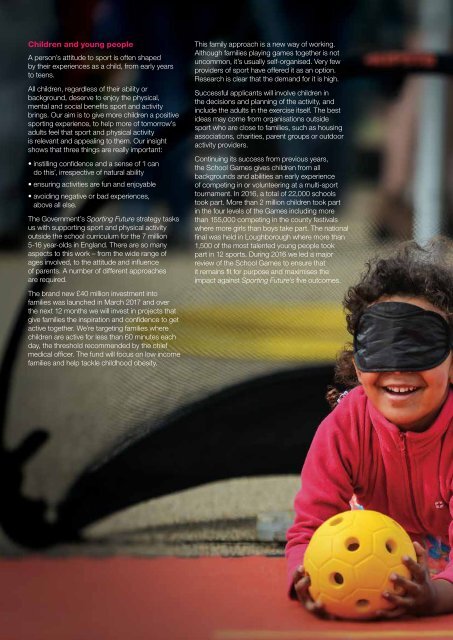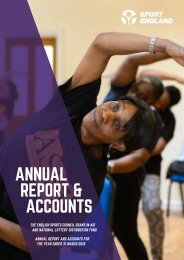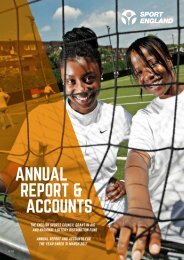WEB_SportEngland_AR_2016-17
Create successful ePaper yourself
Turn your PDF publications into a flip-book with our unique Google optimized e-Paper software.
Children and young people<br />
A person’s attitude to sport is often shaped<br />
by their experiences as a child, from early years<br />
to teens.<br />
All children, regardless of their ability or<br />
background, deserve to enjoy the physical,<br />
mental and social benefits sport and activity<br />
brings. Our aim is to give more children a positive<br />
sporting experience, to help more of tomorrow’s<br />
adults feel that sport and physical activity<br />
is relevant and appealing to them. Our insight<br />
shows that three things are really important:<br />
• instilling confidence and a sense of ‘I can<br />
do this’, irrespective of natural ability<br />
• ensuring activities are fun and enjoyable<br />
• avoiding negative or bad experiences,<br />
above all else.<br />
The Government’s Sporting Future strategy tasks<br />
us with supporting sport and physical activity<br />
outside the school curriculum for the 7 million<br />
5-16 year-olds in England. There are so many<br />
aspects to this work – from the wide range of<br />
ages involved, to the attitude and influence<br />
of parents. A number of different approaches<br />
are required.<br />
The brand new £40 million investment into<br />
families was launched in March 20<strong>17</strong> and over<br />
the next 12 months we will invest in projects that<br />
give families the inspiration and confidence to get<br />
active together. We’re targeting families where<br />
children are active for less than 60 minutes each<br />
day, the threshold recommended by the chief<br />
medical officer. The fund will focus on low income<br />
families and help tackle childhood obesity.<br />
This family approach is a new way of working.<br />
Although families playing games together is not<br />
uncommon, it’s usually self-organised. Very few<br />
providers of sport have offered it as an option.<br />
Research is clear that the demand for it is high.<br />
Successful applicants will involve children in<br />
the decisions and planning of the activity, and<br />
include the adults in the exercise itself. The best<br />
ideas may come from organisations outside<br />
sport who are close to families, such as housing<br />
associations, charities, parent groups or outdoor<br />
activity providers.<br />
Continuing its success from previous years,<br />
the School Games gives children from all<br />
backgrounds and abilities an early experience<br />
of competing in or volunteering at a multi-sport<br />
tournament. In <strong>2016</strong>, a total of 22,000 schools<br />
took part. More than 2 million children took part<br />
in the four levels of the Games including more<br />
than 155,000 competing in the county festivals<br />
where more girls than boys take part. The national<br />
final was held in Loughborough where more than<br />
1,500 of the most talented young people took<br />
part in 12 sports. During <strong>2016</strong> we led a major<br />
review of the School Games to ensure that<br />
it remains fit for purpose and maximises the<br />
impact against Sporting Future’s five outcomes.








